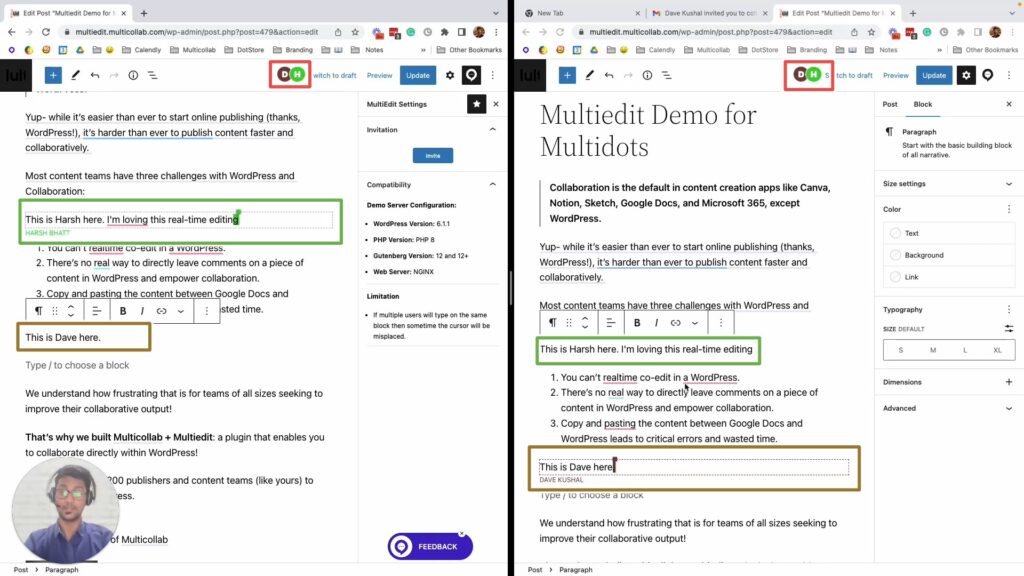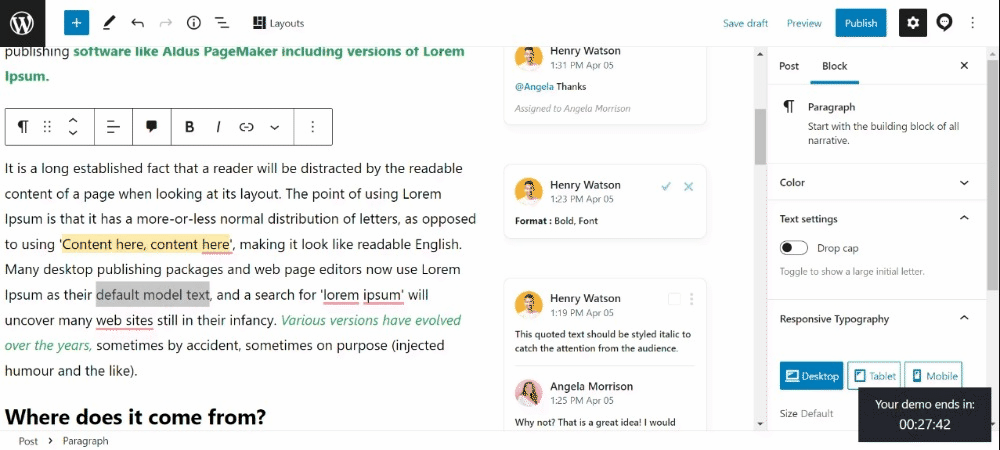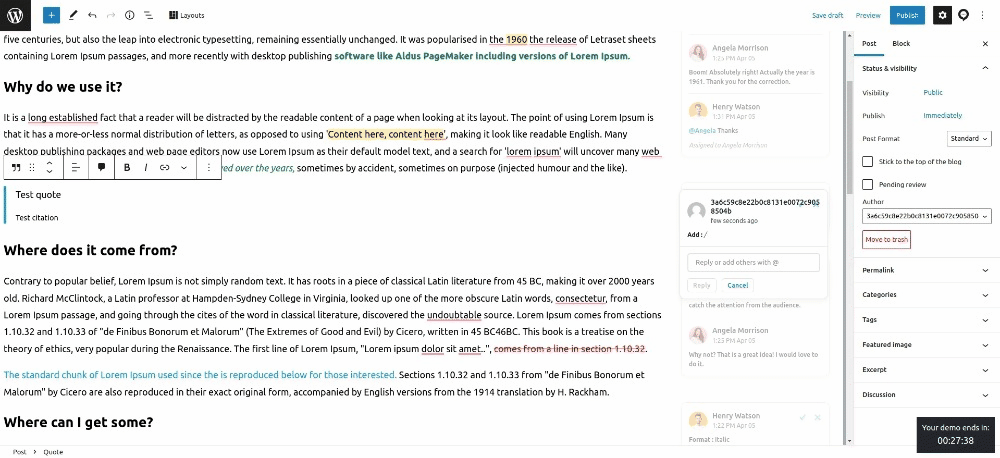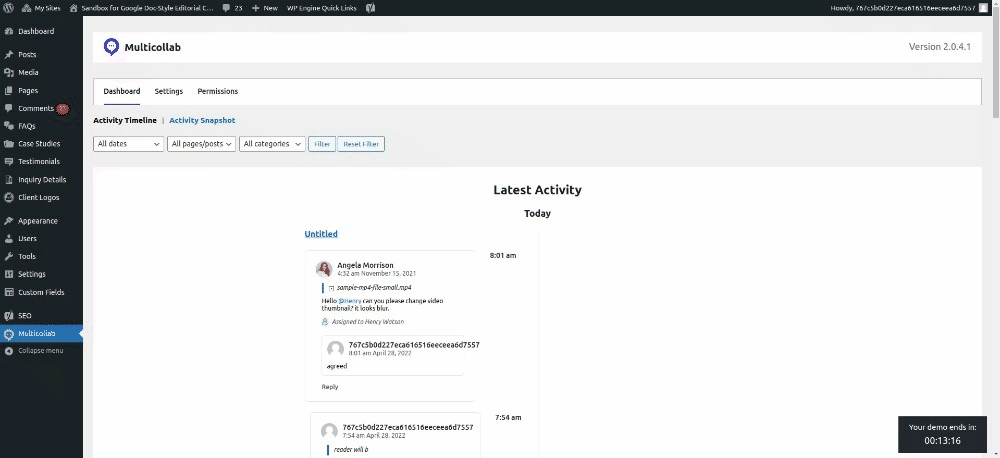Table of Contents
In today’s fast-paced digital age, real-time collaboration has become an essential aspect of successful content creation and management. It allows team members to work together simultaneously, making changes, providing feedback, and sharing ideas without the constraints of time or location.
This seamless interaction not only streamlines the content production process but also fosters a more dynamic and efficient work environment. As content teams continue to adapt to remote work and increased demands for quality content, the need for real-time collaboration tools has become more significant than ever before.
In this article, we’ll explore the concept of real-time collaboration and why WordPress content teams need to embrace this powerful approach to stay ahead of the curve.
What is Real-Time Collaboration?
Real-time collaboration, for content teams, refers to the ability of team members to work together on content projects simultaneously, regardless of their physical location.
This collaboration enables them to edit, review, and provide feedback on documents, web pages, or other content assets while seeing each other’s changes and suggestions in real time. It eliminates the need for back-and-forth emailing of drafts, version control issues, and delays in receiving feedback.
Let’s look at some examples to understand the significance of real-time collaboration for WordPress content teams:
- Co-authoring a blog post: Multiple team members can work together on a single WordPress blog post, with each person contributing their expertise to different sections or elements of the post. This collaborative approach ensures a more comprehensive and engaging piece of content, as it allows for diverse perspectives and insights.
- Real-time editing and feedback: As a content writer drafts a post in WordPress, an editor or reviewer can access the same document and provide real-time feedback, suggestions, and edits. This process not only speeds up the review cycle but also helps maintain a clear and consistent voice throughout the content.
- Collaborative brainstorming sessions: WordPress content teams can use real-time collaboration tools to brainstorm and discuss potential blog topics, content strategies, or campaign ideas. These interactive sessions can lead to more innovative and targeted content, ultimately resulting in better audience engagement and conversion rates.
But how do these applications of real-time collaboration improve the WordPress content production process?
How real-time collaboration makes the WordPress content creation process better
On an organizational level, WordPress content teams can look forward to the following advantages with real-time collaboration:
- Qualitative communication and collaboration between team members as you can instantly share ideas, exchange feedback, and resolve issues leading to a more cohesive and efficient content creation workflow.
- Higher productivity of team members by empowering them to reduce bottlenecks and eliminate unnecessary downtime to speed up content creation.
- Better version control of documents enables your team members to track changes and maintain a clear record of a draft’s evolution. This will also foster a culture of accountability for your organization.
Without the right real-time collaboration tools, WordPress content teams will have to deal with two challenges:
- Slower content production: Teams will have to rely on asynchronous collaboration methods such as email to exchange ideas and feedback which will increase the time required to produce a draft.
- Longer review cycles: During the review phase, all members of the content team actively communicate with each other. This can become time-consuming and frustrating without real-time WordPress collaboration tools.
Producing content while managing the above two difficulties affects the workflow of WordPress teams in the following ways:
- Requirement of more resources in terms of time and effort for producing and reviewing drafts.
- Reduced content quality as longer processes increases the chances of errors and inconsistencies.
Simply put, real-time collaboration is absolutely necessary for WordPress content teams to produce quality content competitively.
So, how can WordPress content teams leverage this?
Multicollab: Real-Time Collaboration for WordPress, Now
Multicollab is a WordPress plugin that transforms the Gutenberg Editor from just a blog editor to a real-time content collaboration workspace by enabling Google Docs-style co-editing features to the platform. Let’s look at the three immediate advantages your content team can look forward to:
1. Real-time Co-editing in the Gutenberg Editor
Your team can draft posts and pages collaboratively just as they do in third-party document collaboration tools like Dropbox Paper and Microsoft Word:

Furthermore, you can also exchange feedback with your team members by tagging them:

This eliminates the need to switch between multiple tools and platforms to make your content creation workflow more efficient.
2. Review all kinds of content
As the Gutenberg Editor is a blog editor, you can create and review all kinds of content including videos and dynamic content (CTA blocks, image carousels, etc.):

This decreases your dependency on traditional content review methods like video calls and text messages and makes your review cycles faster.
3. Secure organizational data
Since your editorial process moves to WordPress, you can manage the permissions of your internal team members and external stakeholders with Multicollab:

As you won’t need to give external teams unrestricted access to your organizational data, your company’s files and folders will be more secure.
Multicollab is a game-changing solution for WordPress content teams to transform their workflow by enabling real-time collaboration in the Gutenberg Editor.
FAQs:
Real-time collaboration is important because it streamlines content production, fosters better communication, enhances efficiency, and improves content quality. It enables teams to work simultaneously, reducing delays and making the content creation process more dynamic.
Collaborating in real-time means team members work together on a project simultaneously, sharing ideas, providing feedback, and editing content while seeing each other’s changes and suggestions instantly, regardless of their physical location.
Yes, with the help of Multicollab, two or more people can edit a WordPress site simultaneously. This real-time coediting functionality in the Gutenberg Editor enables efficient collaboration and faster content production.
The difference between traditional and real-time collaboration lies in the speed and immediacy of feedback and edits. Traditional collaboration often involves delayed responses and multiple versions of content, while real-time collaboration enables instant communication, collaboration, and a streamlined workflow.








